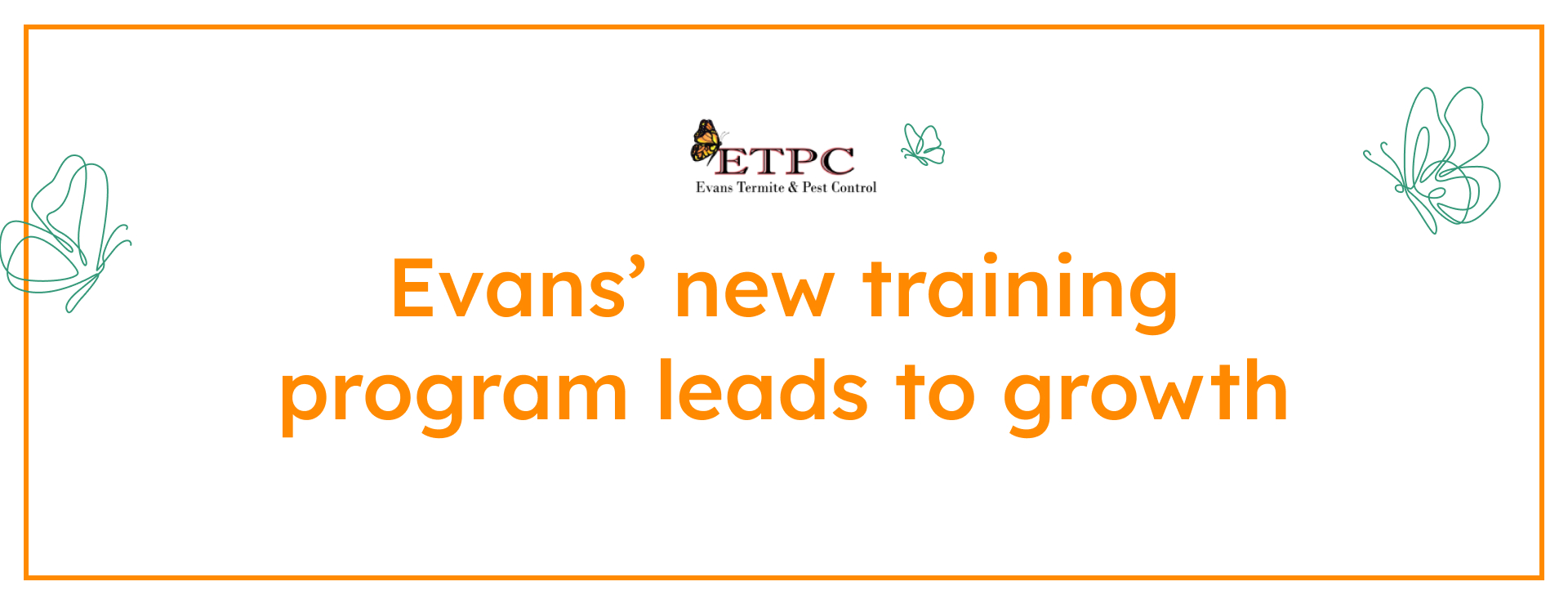
Evans’ new training program leads to growth
It took me three tries to finally hire my first full-time technician. My first attempt was a friend who worked within the industry. I hired him in my 10th month in business and it was a disaster for both of us. I wasn’t ready to hire anyone, and it showed.
A few months later, my second hire was a home inspector friend of mine. After I got him trained, he realized that he didn’t want to do pest control full-time. He finished the summer, went part-time that winter, and quit in the spring.
My third attempt was two years later; it took me a while to feel the urge to hire. I formulated a hiring and training process, and Schopen Pest Solutions started to grow.
My first two failures at hiring and training techs weren’t my last two. For example:
- I had a trainee who flipped off and swore at another driver who cut me off.
- A trainee begged me to take him back to the office after we witnessed a car accident.
- We had a new tech fall off a dock we were de-webbing — right into the Fox River.
- Another trainee quit in the middle of his last day of training because I asked him to check a floor vent. He thought I was too bossy. He called an Uber and drove out of my life.
A similar spot
Smack dab in the hiring process is where Locust Grove, Ga.-based Evans Pest & Termite Control resides these days. This summer, co-owners and married couple Nicole Gorman and Tim Ivey hired one full-time technician and two part-timers, one of which is Nicole’s nephew.
I should point out that Nicole is a second-generation pest management professional: Her dad, Thomas Gorman, bought Evans in 1991 and is still part owner. Nicole joined in 2005 and Tim joined in 2008.
As Evans is growing, they are trying to figure out the best ways to train, formulate the length of the training, keep their employees interested and engaged, build training manuals, put together learning materials, and come up with different ways to teach that will resonate with their people. These are not easy tasks, by any measure.
At Schopen Pest Solutions, we tried to make training memorable and fun. It would take up too much space to go through all of it here, but Nicole and I have spoken about the training tactics I used. Nicole is doing a great job creating a more structured training program for Evans’ current and new employees.
Although Georgia requires 10 classroom hours, Nicole is pushing for 30 for Evans employees. The state also demands 70 hours of in-the-field training; her group will get double that. In addition, she’s building a custom training manual that outlines standard operating procedures (SOPs) for consistency throughout the company.
“Putting together the SOPs and a training manual has been eye-opening,” Nicole admits. “I used to fly by the seat of my pants, but I feel we are more structured now.”

Nicole Gorman
No more babysitting
Nicole knows that for Evans to move forward, she and Tim must have faith in their new employees. There are projects they want to tackle, and they can’t do that if they are babysitting their workers. For example, Nicole wants Evans to add more commercial accounts, and have a greater presence via networking and marketing. They can’t do any of that that if she is in the field running routes.
Nicole and I talked at great length about shortening the training period at Evans. The Peach State already has strict training parameters, but she was stretching the training process out to six months — or longer. While I applaud her thoroughness, as owners, we need our people generating dollars.

Tim Ivey
According to the Evans Pest & Termite Control Strength-Weakness-Opportunity-Threat (SWOT) analysis (see p. 78 of the April issue), Nicole and Tim want to investigate new services and treatments such as termite monitoring. Using their new techs has paid off in a big way for them, as they have doubled their termite baiting revenue this year.
Using industry training
I’ve advised Nicole and Tim to reach out to their suppliers and gather training materials. Most technical representatives are incredible resources for our industry and have fantastic study guides that are fun to read. These materials are usually free and will show technicians how to properly apply pesticides as well as learn the biology of ants, cockroaches, rodents, spiders and more.
This year, the Evans team also plans to charge more for rodent work; flip wood-destroying insect (WDI) home inspection clients into quarterly clients (once they’ve bought the home); and cross-sell products and services to existing clients. At their current rate of growth, hiring people will become a more regular occurrence at Evans in the future.

